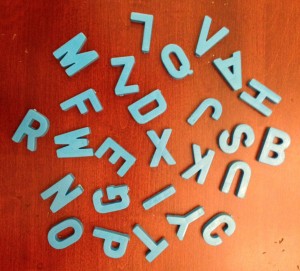Dyslexia Series – Part 4: YOUR Questions… MY Answers
Sorting Through Dyslexia
~~~~~~
Good Wednesday to you.
I am hoping that you will find a nugget of useful information today.
Here’s an organized Q & A format for easy reading.
_____
What was the first indication – there was an issue?
When my son was in Kindergarten he asked, “Can you make the words stop moving on the page?”
Unfortunately, I felt like it was a sight issue since my son was considered to be advanced in letter-sound association and decoding CVC words.
Good News: I had worked with him since age 3. Bad News: It masked the problem.
We had a thorough eye exam with a highly recommended pediatric ophthalmologist. When the results came back, we found out that his vision was better than 20/20.
Even though our son could sound-out Consonant-Vowel-Consonant words, reading a complete passage or little book – out loud – was extremely difficult. The fluency was not there; but, comprehension was spot on.
What were some of the symptoms exhibited?
As you know, dyslexia comes in all shapes and sizes and symptoms.
My son never wrote letters in reverse.
Never confused [b & d] or [p & q].
Never read from right to left.
Here are some of the symptoms we observed:
-Sees non-existent movement while reading (Kindergarten)
– Confuses left/right hands (Kindergarten)
– Difficulty with vision, yet eye exams don’t reveal a problem (Better than 20/20 vision)
-Sharp-sighted and highly observant
-Struggles with spelling (Even as a compensated dyslexic adult, still has difficulty with spelling)
-Handwriting is illegible (Diagnosed with dysgraphia)
-Talented in sports/athletics (Played College Baseball)
– Daydreams (In elementary, mind drifted)
– Tested high on IQ tests – but reading, spelling, and writing skills were below average
– Disorganized
(The list used in writing to you today – David, R. D. (1992). 37 Common Characteristics of Dyslexia. Retrieved April 17, 2015 from Davis Dyslexia Association International, Dyslexia the Gift Web site; http://www.dyslexia.com/library/symptoms.htm)
When did we decide to test for learning differences?
Again I believe if his grades had suffered, we would have heard the alarm earlier and sought intervention sooner.
Our son continued to struggle with reading orally. And in second grade, when worksheets were used to measure comprehension, his pace of completion was very slow and labored. If the worksheet was read to him, the answers were quick and accurate.
What modifications did my son have in school?
Since our son was – term used by his doctor – a high-functioning dyslexic student, our child was adamant against modifications. Period.
He did receive time and half for certain annual, standardized testing beginning in junior high.
It was very important to him not to receive reduced homework assignments or extra time on regular, academic tests.
He requested not to be classified as a Section 504 student.
(Section 504 of the Rehabilitation Act of 1973 is a national law that protects qualified individuals from discrimination based on their disability. Cited directly from the U.S. Department of Health and Human Services/ Office for Civil Rights/ Washington, D.C.)
What type of schools did we choose for our son?
This could be a complete post in itself. And it will be… one day.
We sent our son to both public and parochial (Christian) schools.
At that time, schools did not readily accept or receive the diagnosis of dyslexia well. (My personal opinion.)
How did we collaborate with our son’s teachers?
Again, keep in mind that our son is 24-years-old now…so this was years ago.
After reading some of my previously written commentary on our early educational experiences, I sadly realized that I sanitized my words. I tried to wash away the sting with diluted, politically correct verbiage.
When I began My Written Thoughts, I made a vow to myself.. and for my Readers…to stop trying desperately to be polite and inoffensive on every subject.
So with that in mind…
Dyslexia was considered by some educators as an academic excuse and a made-up explanation for a struggling reader.
For many years, we found ourselves gingerly balancing a very delicate relationship with certain teachers.
There was one particular year that I lost a ton of weight due to worry. (Not a good weight loss plan)
From my personal perspective, there were some teachers who had a resentful attitude toward students who were dyslexic and viewed Section 504 students as making their job more difficult.
I can admit to you today, as a mom and tutor, I am still severely shocked and hurt by the attitude and actions of certain educators.
_____
Fortunately, I understand from parents of my current students (whom I tutor) ….The tide has turned, and the acceptance of dyslexia is the general consensus. The laws of protection are being honored and observed now. So thankful for this advancement in our school system.
_____
As promised, each week I will add to my Dyslexia Series.
Part 1 – Letter to Parents of Dyslexic Children. Click here.
Part 2 – Finding a Tutor. Click here.
Part 3 – 2 Essential Websites for Parents. Click here.
There are two other posts which may be of interest to you if your child is very young: Giving your Toddler an Advantage Parts 1 & 2.
_____
So appreciate the new readers this week! You make me want to write even more.
Talk to you tomorrow.





